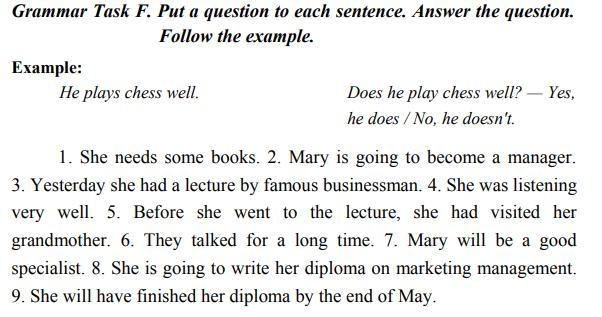Put a question to each sentence. Answer the question. Follow the example.
Example:
He plays chess well. Does he play chess well? — Yes,
he does / No, he doesn't.
1. She needs some books. 2. Mary is going to become a manager.
3. Yesterday she had a lecture by famous businessman. 4. She was listening
very well. 5. Before she went to the lecture, she had visited her
grandmother. 6. They talked for a long time. 7. Mary will be a good
specialist. 8. She is going to write her diploma on marketing management.
9. She will have finished her diploma by the end of May.

Ответы
1. She needs some books.
Does she need some books? - Yes, she does / No, she doesn't.
2. Mary is going to become a manager.
Is Mary going to become a manager? - Yes, she is / No, she isn't.
3. Yesterday she had a lecture by famous businessman.
Did she have a lecture by famous businessman yesterday
- Yes, she did / No, she didn't..
4. She was listening very well.
Was she listening very well? - Yes, she was / No, she wasn't.
5. Before she went to the lecture, she had visited her grandmother.
Had she visited her grandmother before she went to the lecture?
Yes, she had / No, she hadn't.
6. They talked for a long time.
Did they talk for a long time? - Yes, they did / No, they didn't.
7. Mary will be a good specialist.
Will Mary be a good specialist? - Yes, she will / No, she won't.
8. She is going to write her diploma on marketing management.
Is she going to write her diploma on marketing management?
- Yes, she is / No, she isn't.
9. She will have finished her diploma by the end of May.
Will she have finished her diploma by the end of May?
- Yes, she will / No, she won't.